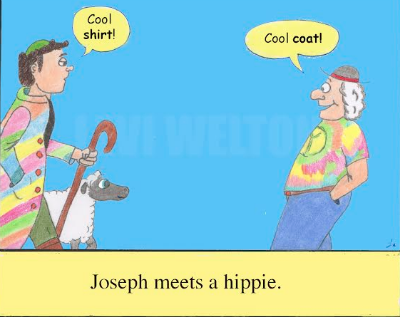
Was Joseph a hippie?
Well, the Bible does mention that Joseph was a young man who was a dreamer (Genesis 36:8), with funky hair (Gen. Rabbah 84:7), who wore a "coat of many colors" (Genesis 37:3). Growing up as a kid a few blocks from Peoples Park in Berkeley, this description would have fit most of the hippies I hung out with there. So, all the cute similarities aside, would this Biblical character have had any meaningful connection to the counter-culture youth movement of the 60s? Let's examine the story of Joseph through the lens of a Kabbalistic teaching, and then you can be the judge of this yourself.
Classic understanding of the scripture of Joseph and his brothers reveals a typical tale of jealousy and sibling rivalry, probably instigated by their fathers favoritism of his beloved Rachel's eldest son. Yet, according to the Kabbala (Toras Chayim, Vayechi, p. 104d) there's more than meets the eye in regards to the tension here, and, actually, a deeper conflict regarding spiritual modalities was at the heart of their rivalry. It was for the unique beliefs of Joseph that Jacob loved his son so much. For he represented a new concept of spiritual enlightenment that was refreshingly different than the theology of his brothers.
Up until Joseph, the progeny of Abraham and Sarah, were shepherds. Their camp was one that roamed the hillsides outside the cities of their time. This enabled them to be mystics who could practice spirituality away from the distractions of the the metropolitan culture and society. Then Joseph came on the scene, promoting a revolutionary idea of how to experience spirituality. He believed that one didn't have to be an isolated monk to find spiritual fulfillment. He believed that spirituality could be found in the physicality, and not away from it. In other words, the seeming opposing drives of the spiritual and physical did not have to be compartmentalized into spiritual enlightenment on one day, versus physical enjoyment on another. One could live each day pursuing and expressing the highest spiritual light of their souls, while simultaneously engaging with all the physicality of the human experience. His counter-culture personality was one of spiritual evolution, as alluded to by his very name "Joseph," meaning, "to add and increase" (Genesis 30:24).
The brothers saw this as a theological danger to their way of spirituality. This idea of attempting to combine ethereal holiness with physical mundanity scared them so much they felt compelled to get rid of this "dreamer" before he corrupted all they stood for. This was why the brothers didn't "recognize Joseph" when he sat upon the throne of Egypt (Genesis 42:8). They couldn't fathom that a son of Jacob could be a politician and a saint at the same time. The idea that the seemingly opposing goals of spirituality and corporeality could be united into one path of spiritual growth (Torah Or, p. 103b) was a radical one. They didn't have the vision to comprehend a society that could blend economics with charity, fashion with humility, or eating with prayer. This was the secret Joseph revealed to them when he said: "God has done all of this" (Genesis 45:8-9). He showed them how his model of spiritual unity revealed the Divine in his personification of being both physically and spiritually successful at the same time. Perhaps this is why the entire Book of Genesis concludes precisely with this circle of events, of Joseph becoming a great leader in Egypt and reuniting with his brothers. For there is something revolutionary about the spirituality of Joseph that serves as the perfect culmination to the story of Creation, of physicality.
To this end, Josephs symbol was one of a rainbow of colors. His spiritual path was one that taught that differences were created in the world for the sake of unification rather than segregation. Perhaps this is why it is only Joseph that is called "Joseph the Righteous" throughout all of the Talmudic writings (Midrash Tanchuma 58:4). Righteousness is not when our views create isolation, but when they build unity in the world. It is this acceptance, celebration and active unity of diversity that makes one truly righteous. Joseph represents the message that is doesn't matter what color of the rainbow you are, we all matter and we all belong. Perhaps that's why Jacob fathered the "twelve tribes of Israel" and not the "one tribe of Israel" (Exod 24:4). To teach his progeny the lesson of Joseph: It is only when we celebrate our differences as a coat of many different colors that we can fulfill the purpose of Genesis and make this world into a peaceful Garden for God (Song of Solomon 5:1; Basi Legani Mamar 1951).
